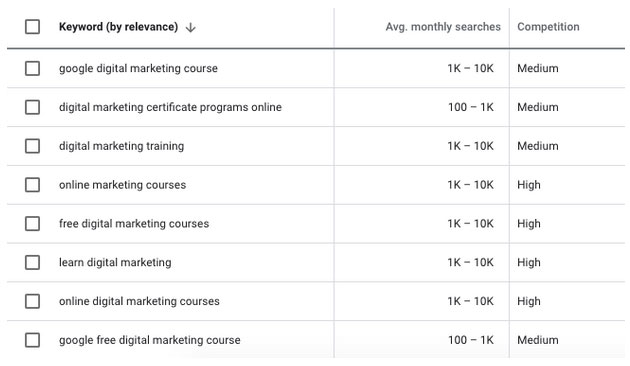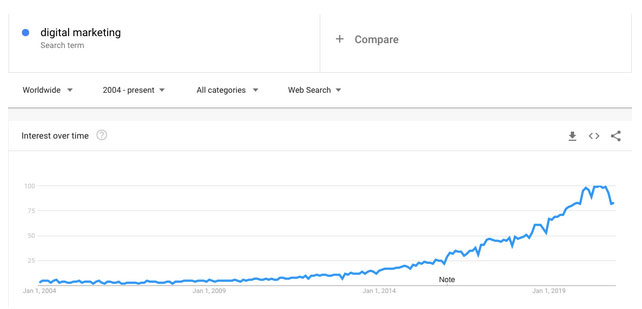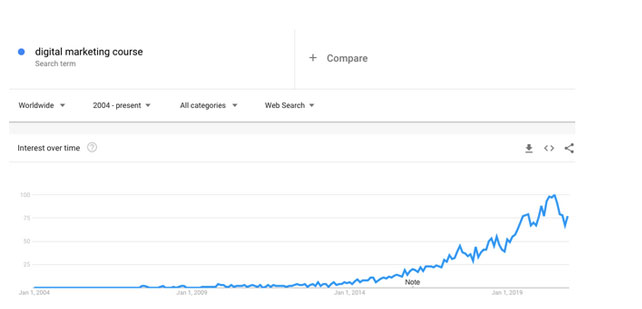
When it comes to building a highly profitable education business, choosing the right course is without a doubt the most important piece of the puzzle.
A critical first step in making sure you’ve picked a winner is evaluating the market demand, existing competition and viability of the course itself.
Get this step wrong and you run the risk of wasting your time and energy, or worse, sinking a bunch of money into creating a course which you cannot sell.
Get it right and you set yourself up for sales and success.
To help you determine if you’ve got a viable and profitable product idea on your hands, we’ve put together this comprehensive guide that shows you exactly how to take a look “under the hood” of your market and your course to make sure you’re building your business on a strong foundation.
Let’s dive in.
Note: In this post we’re going to show you how to analyze a variety of factors to better understand the viability of your course idea. We will do this by using our own course choice, a digital marketing course, as a case study.
It's important to remember that no single factor can give you 100% confidence in your course choice. Rather, it’s a combination of many factors that will help you paint a more complete picture and will allow you to make the best possible decision.
Before we get into our evaluation, we first need to recognize that there are several ways we can build a business around a digital marketing course. The first step is to decide how we want to build this business: create your own content, license it from a third party, hire a content developer, or use tyootr marketplace.
For this evaluation we have decided to evaluate the viability of building a business around creating our own digital marketing course. Remember, when choosing a business type of your own, you can always go back and reevaluate other business models if your first choice doesn't meet enough of the criteria below.
For each evaluation criteria below, we’re going to briefly explain it and then use it to evaluate our course idea. Many of the decisions are arbitrary and you may have a slightly different opinion for each criteria. For many of the points there won't be perfect answers, rather educated guesses. Each of these criteria are meant to help you better understand your own course choice and all the factors of building a business around it.
You can use these 16 questions as a framework, substituting our course choice for your own in order to get a better idea of your course potential and to avoid dangerous potential pitfalls.
The first thing we want to look at is market based criteria. These are criteria that are usually external facing like market size, target customer, whether you're dealing with a trending course, and so on.
1. What is the potential market size or demand?
Gauging market size and demand can be difficult but you’re going to want to have some sense of the potential market size and demand before investing any significant amount of time, money and energy in your venture. It can be as simple as using a service like Buzzsumo to better understand how many people per each day are talking about your potential course. Perhaps the most popular tool is the Google Keyword Planner Tool which will help you determine how many people each month are searching for keywords related to your course idea.
Evaluation: We determined in our last post that search volume for digital marketing courses are extremely high. Using Google’s Keyword Planner Tool we were able to determine that there are over 100K searches per month in the USA and Canada for digital marketing courses and similar keywords.

Using Buzzsumo, we were also able to determine that there were approximately 8000 Tweets per day mentioning our main keywords.
This information doesn’t give us 100% certainty that our potential products will have a market of buyers but it's a vote of confidence that if we do launch a digital marketing course, there are likely people with interest in learning more.
2. Who are your competitors?
It’s always good to know who you’ll be competing against if you choose to start your business. The more you understand about the competitive landscape before you start your business, the less potential surprises you’ll face later.
Learn More: How to conduct a SWOT Analysis for your business
Evaluation: From our analysis and as we mentioned in our previous post, there are three areas of competition in the digital marketing training course:
We didn’t find any true market leaders for digital marketing courses rather a very fragmented market of instructors and companies.
3. Is it a trend, fad, flat or growing market?
Just as important as knowing your potential market size and demand, is also knowing which direction the market is going. The last thing you want to do is spend a lot of time, money and effort to create a course and establish a business just to find that you missed the boat and the market is rapidly declining.
Evaluation: We know from Google Trends that the search interest has grown significantly over the last several years.
“Digital marketing”

"Digital marketing course”

Even though digital marketing is trending high right now, the digital marketing techniques and tools are always going through massive marketing shifts that highlight and push new key ingredients as “breakthroughs” to stimulate sales. It’s important to recognize that in time, and constantly update the content to stay relevant to the modern digital marketing techniques.
4. Who are your target customers?
Before you fully decide on a course, it’s important to get a sense of who your potential customers are. You don’t want to find out too late that all the people that would be potentially interested in your course can’t purchase (i.e. kids without credit cards).
Traditionally if there were some major players in the market, we could use channels like Quantcast and Alexa to find out more about the demographic information of our potential target market. Although we couldn’t find any major competitors, we analyzed a few websites and companies selling digital marketing courses. From the analysis, we can assume the average age is 18-45 who are talking about or purchasing digital marketing courses.
To get a better idea of our potential target customers, we took to Twitter. From our last post we know that everyday there are approximately 8K Tweets that mention the keywords “digital marketing” so we took a closer look at who exactly these people are that are talking about digital marketing. From this analysis, and as we expected, the people on Twitter talking about our product idea were overwhelmingly working professionals.
We also know from Google Trends where our target customers predominantly live.
From this information we know we can easily reach our potential customers and in general, we know this particular demographic isn’t adverse or shy about spending money online.
Now that we have reviewed our market based criteria and feel confident in the market, the direction it’s going and our target customers, it’s time to consider factors surrounding the actual course itself.
Course based criteria deal directly with the course viability. These criteria can help you get a better understanding of what your course strengths are and potential pitfalls to be aware of.
5. What is your potential selling price?
The lower the price, the lower the potential profit per unit. This translates into more marketing dollars to find more customers. It has been generally accepted by many top elearning entrepreneurs that courses that sell between $50-$150 hit a certain sweet spot where you can make a respectable amount per unit but aren't too high that customers are hesitant to purchase online or expect premium services like phone support.
Evaluation We looked at approximately two dozen websites selling digital marketing courses. After looking at average cost per course we determined that we would be able to charge approximately $125. This low price point means our margins will be small and can make it difficult to use paid advertising channels, especially when we first start out.
6. What is your potential markup?
Markup is the amount over the cost of the course. This amount is what will cover your overhead and be your profit. Remember, when looking at potential markup, you may also want to consider how it may change as your business grows. For example, if we start out making our own digital marketing self study course we would likely be starting with relatively low cost video production methods. However, as we grow and our sales volume goes up, our production costs will be met and also allow us to recreate better engaging videos.
Evaluation From our analysis of potential selling price, we know we can comfortably sell a premium digital marketing self study course for $125. Since the content is created by us, we do not have any cost of sales except for customer acquisition and marketing costs.
If we are to not invest anything on creating our own content, we will have to find a third party content partner or find a course in tyootr marketplace to resell. An average license for digital marketing self study course in tyootr marketplace will cost us anywhere between $20 - $50 based on the quality, length or the syllabus. In such instances, our cost of sale will be $20-$50, plus customer acquisition costs and other operational costs. This will reduce our profit margin but time to market is in seconds and we do not invest anything on content upgrades and maintenance.
7. Can you offer a subscription?
Far from necessary to build a successful online business, however the ability to offer a subscription for your course is very desirable as it helps increase your lifetime customer value, provides you the ability to spend more to acquire customers, and decreases the number of customers you need to build a successful business.
Evaluation If your customer is a marketing professional and is committed to continuous learning in the field of marketing and sales, then a subscription will add a lot of value to your customer. Your customer will be willing to get a subscription only if we provide a variety of courses covering all aspects of marketing and sales.
8. Is there a certification exam by the end of the course? How credible is our course and exam?
Exams by the end of each course will help to evaluate the students' understanding of the topics within the course. Issuing a course completion certificate and or certificate based on successfully passing the exam will add more credibility to our course and content.
Evaluation We analyzed various e-learning companies and we understand that course completion certificates, digital badges and certification exams are some common practise to validate student skills and achievements. Arguably it also serves a passion or achievement students want to share among their network or social media platforms which will also increase the course visibility.
9. Does your course help students upskill and stay relevant in the market?
Courses that help students learn new and updated skills are much easier to sell than a complex outdated syllabus. The skills students acquire are more likely implemented at work or in the projects they work. The course which helps students acquire the desired skills are more valuable than a qualification “nice-to-have”.
Evaluation It’s fair to say that our course choice can definitely help students learn new skills and tools in digital marketing. Arguably it also serves as a credential which will help them advance their careers.
10. Does your course require renewal, continuous learning and recertification?
Digital marketing is a dynamic industry where new tools and techniques evolve every day. What works today will be outdated tomorrow. Digital platforms like Google, Facebook, Twitter, Instagram, LinkedIn and others constantly update their algorithms. Content and ad rankings are based on these algorithms and hence a continuous learning and understanding of these platform works are essential to keep ourselves in the game.
Evaluation As a digital marketing course, our course choice definitely falls under the category that requires continuous learning and constant content upgrade. We can release an update or a new course everytime there’s a major change or improvement in the tools and techniques used in digital marketing.
After looking at and taking into account all market and course criteria, we feel pretty strongly about our course idea and the potential market for it. Some highlights that really stand out to us are the low cost to start this business, strong search demand, trend trajectory, and low competition keywords that we feel we could rank well for in Google over time.
However, we do have a few concerns that prevent this from being a slam dunk. Some of the biggest concerns include a low course price point and the competitive landscape.
A large part of the potential success of our course idea would come from being able to develop a course that is notably better than other marketing courses, building a brand around it and ranking high for the keyword opportunities we identified.
What are your thoughts? Based on the criteria above, how confident or unconfident are you in our course choice?